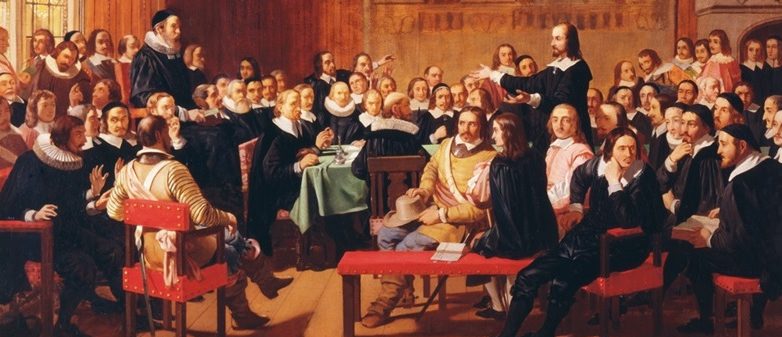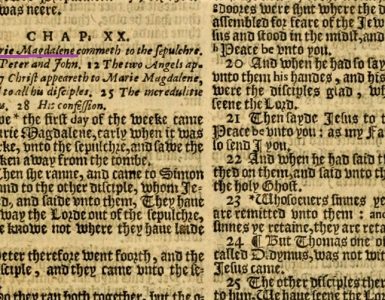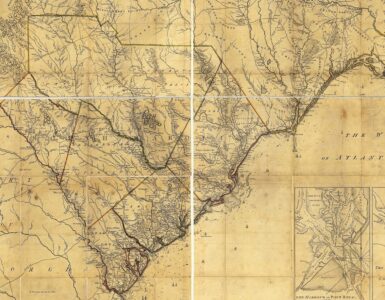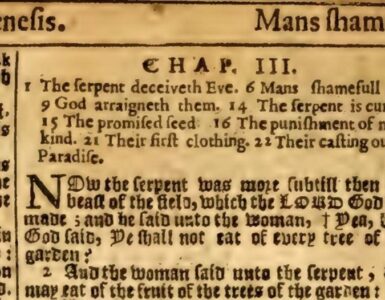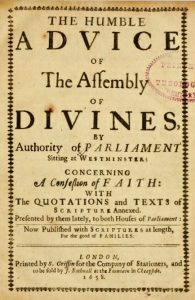 Some individuals have said that the Westminster Confession of Faith has ordered chapters one and two out of sequence and they should be swapped. It is said in support of the criticism that the beginning of everything is God, and then he gave us the Word. Of course, God is the beginning of everything other than himself because he has always been and will always be, but the only way to know the Father’s redemptive plan as accomplished through the Son and applied by the Holy Spirit is through his special revelation called the Bible. So when the Westminster Assembly commissioners composed the Confession their abundance of wisdom determined that instruction regarding God’s inscripturated will must necessarily come first because all that is to be known of God is authoritatively, perfectly, infallibly, and inerrantly given in Scripture. The ministers and professors gathered at Westminster expressed it well in the first paragraph of chapter one.
Some individuals have said that the Westminster Confession of Faith has ordered chapters one and two out of sequence and they should be swapped. It is said in support of the criticism that the beginning of everything is God, and then he gave us the Word. Of course, God is the beginning of everything other than himself because he has always been and will always be, but the only way to know the Father’s redemptive plan as accomplished through the Son and applied by the Holy Spirit is through his special revelation called the Bible. So when the Westminster Assembly commissioners composed the Confession their abundance of wisdom determined that instruction regarding God’s inscripturated will must necessarily come first because all that is to be known of God is authoritatively, perfectly, infallibly, and inerrantly given in Scripture. The ministers and professors gathered at Westminster expressed it well in the first paragraph of chapter one.
Although the light of nature, and the works of creation and providence, do so far manifest the goodness, wisdom, and power of God, as to leave men inexcusable; yet they are not sufficient to give that knowledge of God, and of his will, which is necessary unto salvation. Therefore it pleased the Lord, at sundry times, and in divers manners, to reveal himself, and to declare that his will unto his church; and afterwards, for the better preserving and propagating of the truth, and for the more sure establishment and comfort of the church against the corruption of the flesh, and the malice of Satan and of the world, to commit the same wholly unto writing: which maketh the holy Scripture to be most necessary; those former ways of God’s revealing his will unto his people being now ceased. (See Notes below for edition)
It is one of the greatest paragraphs of confessional literature ever composed. As a statement in a confession of faith it summarizes aspects of essential doctrine concerning the doctrine of the Word of God. Some might criticize the paragraph because God’s revelation through conscience is not mentioned, but it is indirectly addressed because the “works of creation” include man as male and female who were made by God upright in all aspects including conscience, but because of the fall, the conscience was cursed. God made man in his image with conscience as an aspect of the imago Dei; God has a conscience, so man has a conscience. The works of creation and providence that “manifest the goodness, wisdom, and power of God” are inadequate for providing definitive knowledge of the grace of Salvation through the work of Christ. God, in his grace, has provided the sense of his “goodness, wisdom, and power” to humanity of all time in creation and providence, but there is a problem because creation and providence cannot lead to knowledge of God. Thus, numerous world religions have taken the gracious glimmers of revealed light given in creation and providence and misinterpreted them by creating false systems.
If paragraph one of the Confession ended with the first sentence and there was no way to bring fuller knowledge of God, it would leave the world hopelessly dead in trespasses and sins grasping at slivers of light unable to find their source. But there is help. There is a dramatic transition as the next sentence begins, “Therefore.” Whether the Assembly was thinking of transitional uses of therefore in Scripture, such as in Romans 8:1, is not noted, but given the biblical knowledge gathered in the Jerusalem Chamber at Westminster, the word was surely in their glossary of important terms. God’s grace to provide his Word merits the transition provided by, therefore. The problem of insufficient revelation was remedied by God as he gave sufficient revelation (i.e. all that is needed to know about God and his will). God condescended to provide the world with his authoritative and unique Word that is necessary for knowledge of him.
How did God choose to reveal his will? Did he drop from heaven a nicely bound leather volume trimmed in gold leaf? Did he entrance automaton scribes whose writing implements were extensions of his hand? Did chariots driven by angels descend from the sky and announce their archive of scrolls to be God’s word? No, the process was quite ordinary, except of course, for events such as the Ten Commandments written by God in stone; the handwriting on the wall revealed to Belshazzar, and the talking donkey that rebuked Balaam. The Confession says, “Therefore it pleased the Lord, at sundry times, and in divers manners, to reveal himself, and to declare that his will unto his church.” Over the course of centuries beginning with the first book of Scripture composed, possibly Job, and ending with the last book composed, Revelation, God revealed himself and his will. He revealed himself by theophany; by speaking directly to people, such as to Moses and other prophets; and via angelic messengers such as Gabriel. But for declaring “his will to his church” the process of inscripturation over centuries reveals not only the aspects just mentioned, but the entire content needed to know God and his will. God used ordinary, fallible men possessed with passions and subject to sin to give the world the infallible Word. These authors were copiously inspired such that every jot and tittle was as if God had written it with his own hand, but not in such a way that the process negated the style or personality of the writer. As the Confession says in a later paragraph, this long-term process of periods of revelation through many centuries by a variety of penmen produced a unified Bible that agrees in all its parts.
For what purpose is the Bible to be used? It is used to preserve and propagate the truth and to protect the church. It propagates the truth by giving answer to the Philippian jailor’s question, “What must I do to be saved?” It gives instruction concerning growth in sanctification as the flesh is suppressed and the believer learns increasingly how to glorify and enjoy God. When the Confession was composed, it not only set forth essential doctrines but addressed other theological systems of the era. Included among these systems were Anabaptism which in some cases involved mysticism, Arminian soteriology, Socinianism (ancestor of Unitarianism), and most obviously, given the post-Reformation interests of the Westminster Assembly, the teachings of Rome. Scripture provides, says the Confession, “the more sure establishment and comfort of the church against the corruption of the flesh, and the malice of Satan and of the world,” by being committed “wholly unto writing.” Scripture is the anchor in the sea of sin and temptation because it is complete, sufficient, efficient, and permanent. The truth is propagated by Scripture and the Bible is the ruler by which all teaching is measured.
In light of the emphasis on diversity in our world, the necessity, finality, and uniqueness of Scripture are offensive to many. Since Satan’s “Hath God said?” through Pilate’s “What is truth?” into an age claiming truth is within and the more diverse it be the better—God’s unique and necessary Word stands true. The Bible is necessary for knowledge of God, and it is complete because the “former ways of God’s revealing his will unto his people being now ceased.” The Bible is not an ingredient to be thrown in a collective pot of world religious writings, stirred up, and ladled into a bowl to be spiced to one’s own taste. When Jesus said, “Sanctify them in your truth, your Word is truth,” he meant it. As Francis Schaeffer assessed the philosophy and theology of his day, he observed there were many views claiming to be the truth, so he started describing the Bible and the gospel as “true truth” to emphasize the uniqueness of Scripture. The situation in Schaeffer’s era is more prevalent today because religious diversity submerges true knowledge of God via Scripture in an unrighteous sea of religious eclecticism.
The Westminster Assembly’s confession is well thought out because it begins with a chapter that establishes the source for definitive knowledge of God in the infallible and inspired Word. Creation and providence can go only so far, but Scripture reveals “the depth of the riches and wisdom and knowledge of God! How unsearchable are his judgments and how inscrutable his ways!” (Romans 11:33)
Barry Waugh
Notes—The header is provided courtesy of Reformation Art. The WCF title page was pulled from Internet Archive. The WCF quoted is from the Free Church of Scotland website, Confession of Faith agreed upon by the Assembly of Divines at Westminster: Examined and approved, Anno 1647, by the General Assembly of the Church of Scotland; and ratified by Acts of Parliament 1649 and 1690.


